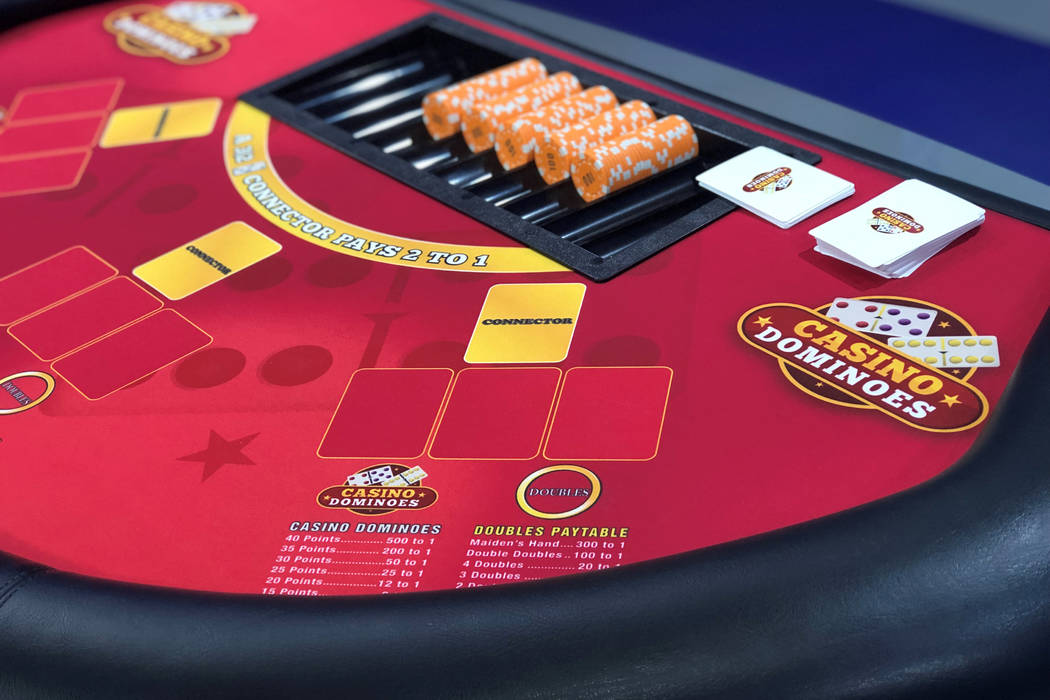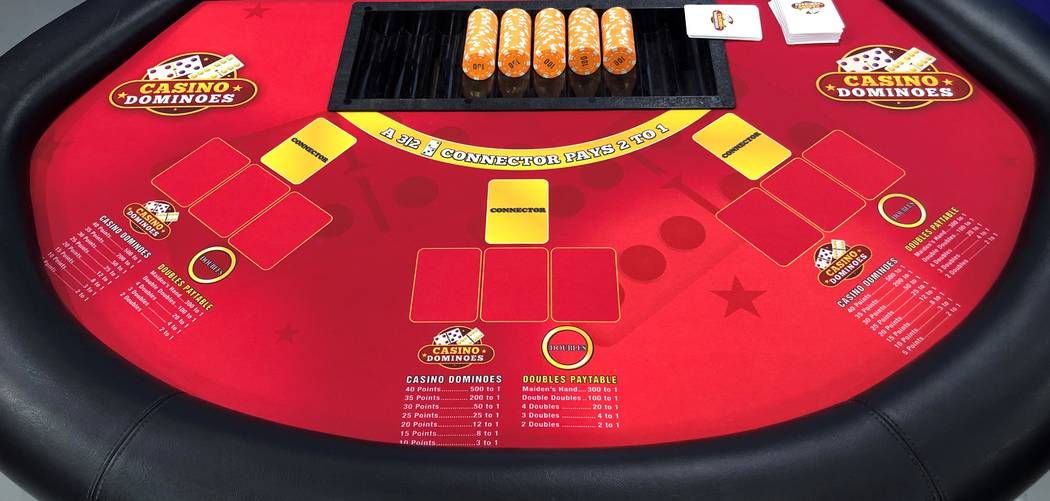UNLV grad creates Casino Dominoes game at Plaza Las Vegas


It took me only five hands to double my money when I sat down to play Casino Dominoes at the Plaza last week.
Trust me, it was beginner’s luck.
The new game, which faces final Nevada Gaming Commission approval Thursday after a successful 45-day trial that wrapped up in November, is being played as a table game exclusively at the Plaza daily between 6 p.m., and 2 a.m. With any beginner’s luck for the game’s inventor, 42-year-old Harold Moret, a UNLV graduate, it’ll be available in other casinos in Nevada and across the country before long.
For Moret, who has been passionate about playing dominoes ever since he learned games from his grandfather 30 years ago, getting a version of dominoes on the casino floor in his first try was his version of beginner’s luck.
It was a historic first as well: Casino Dominoes is the first game successfully brought to the casino floor by an African-American game inventor.
But it’s more about hard work than luck.
“You can’t just get excited and do something for a couple of weeks and think that it’s done,” Moret said. “You really have to stick to it.”
Sticking to it means traveling and meeting with casino bosses to sell them on dedicating floor space to a game that has the same footprint as the average blackjack table. It also means showing up at the Plaza four times a week to distribute brochures about the game and talk with players.
He sells casinos with the numbers. Casino Dominoes has the same house edge as Three Card Poker, about 5.34 percent, meaning casinos can be more profitable with dominoes than they are with blackjack, baccarat or craps. The trick is getting players to shift away from the ever-popular blackjack.
The game isn’t too hard to learn and appeals to dominoes aficionados.
Moret has replaced traditional domino tiles with playing cards with domino markings. The domino deck has 56 cards, two sets of 28. That enables players to try for high-payout side bets involving multiple doubles.
Here’s how the game, a variation of Muggins, is played: The dealer distributes four cards face up to each player in up to six positions at a table. The last of the four cards dealt is the “connector.”
There’s no competition with other players or the house; each hand stands on its own and is for each player to win or lose.
The goal for each player is to link the three domino cards to the connector. So, for example, if the connector card is a 3 and a 6, any of those three dominoes connect to the other three cards if they have a 3 or a 6 on them. Points are calculated based on the value of the unconnected ends, and doubles are counted on both ends.
Example: If the connector card is a 6/3 and the domino cards are 6/6, 5/3 and 4/2, the 6/6 would produce 15 points (6+6+3); the 5/3 would produce nine points (6 + 3); while the 4/2 would be unconnected and worth nothing.
Payoffs are based on point totals equaling multiples of five, with 15 points rewarded at 8-to-1; 10 points, 3-to-1; and five points, 2-to-1.
The night I played, the minimum wager was $5.
My luckiest moment occurred when I was dealt a 3/2 to the connector position. A successful connection with 3/2 in the connector position rewards the player a 5-point bonus effectively paying 2 to 1.
Then, there are the doubles side bets. Those are calculated from all of the four cards dealt. Two doubles pays 2-to-1; three win 4-to-1; four is 20-to-1; double doubles pays 100-to-1; and a so-called “maiden’s hand” — the double 6, 5, 4 and 3 — pays 300-to-1. A $5 bet with a maiden’s hand would result in a payout of $1,500.
My $20 bankroll with minimum bets climbed to $40 after four hands. I lost the last hand, tipped my dealer five bucks and walked out with $10 more than I had when I walked in.
Moret has a ready market at the Plaza on the last Saturday of each month when the Universal Domino League — which he founded and has 50,000 players worldwide — has a tournament with cash prizes. He said about 150 to 250 participants show up regularly for tournaments at the Plaza and an equal number are there to support players and to watch.
Once Moret has more Casino Dominoes tables in play — he earns between $500 and $1,000 per table per month as a fee — he’ll intensify efforts on a second dominoes-based game, a variation of the popular Mexican Train game that my mother taught me to play.
I can’t wait to see her try her beginners’ luck at that once it’s introduced.
Contact Richard N. Velotta at rvelotta@reviewjournal.com or 702-477-3893. Follow @RickVelotta on Twitter.













